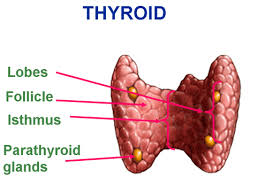The thyroid gland is regulated by thyroid-stimulating hormone (TSH), which is made by the pituitary gland in the brain. Normally, when thyroid hormone levels in the body are high, they will “switch off” the production of TSH, which in turn stops the thyroid from making more T4 and T3.
Problems occur when the thyroid gland becomes either underactive (hypothyroidism) or overactive (hyperthyroidism). Thyroid problems are more common in women than men. Cancer may also develop in the thyroid gland.
Causes
Thyroid diseases sometimes result from inappropriate TSH levels, or may be caused by problems in the thyroid gland itself.
The most common cause of hypothyroidism is Hashimoto’s thyroiditis,an autoimmune condition where the body makes antibodies that destroy parts of the thyroid gland. Surgical removal and certain medications (e.g., amiodarone, lithium) can also cause hypothyroidism.
Other causes of hypothyroidism include pituitary problems, hypothalamus problems, and iodine deficiency (rare in North America, but affects nearly 2 billion people worldwide). Some babies are born with hypothyroidism – this is called congenital hypothyroidism.
There are different causes of hyperthyroidism. Graves’ disease is the most common cause of hyperthyroidism. This condition occurs when the immune system produces an antibody that stimulates the entire thyroid gland; this leads to overactivity and higher levels of thyroid hormones.
Another form of hyperthyroidism is called toxic nodular goiter or toxic thyroid adenoma. Adenomas, abnormal nodules of tissue in the thyroid, constantly produce thyroid hormones even when they are not needed.
Secondary hyperthyroidism is caused when the pituitary gland makes too much TSH, leading to constant stimulation of the thyroid gland. A pituitary tumour may cause TSH levels to rise. More rarely, the pituitary gland becomes insensitive to thyroid hormones, no longer responding to high levels.
Another possible cause of hyperthyroidism is a condition called thyroiditis. This condition occurs when the thyroid gland becomes inflamed. Depending on the type of thyroiditis, this may lead to temporary hyperthyroidism that might be followed by hypothyroidism.
There are four types of thyroid cancers: papillary, follicular, anaplastic, and medullary cancer. These are associated with radiation treatment to the head, neck, or chest. Radiation treatment for benign (non-cancerous) conditions is no longer carried out in these areas, but was more common in the past. In other cases, a genetic mutation might be associated with thyroid cancer, either alone or in conjunction with other types of cancers (e.g., multiple endocrine neoplasia, BRAF gene mutations). Less commonly, other cancers might metastasize to the thyroid (e.g., lymphoma, breast cancer).
Symptoms and Complications
Hypothyroidism results in low levels of T4 and T3 in the blood. Not having enough T4 and T3 in the blood causes your metabolism to slow down.
Common symptoms include:
- coarse and dry hair
- confusion or forgetfulness (often mistaken for dementia in seniors)
- constipation
- depression
- dry, scaly skin
- fatigue or a feeling of sluggishness
- hair loss
- increased menstrual flow (women)
- intolerance to cold temperatures
- irritability
- muscle cramps
- slower heart rate
- weakness
- weight gain
- If hypothyroidism isn’t treated, the symptoms will progress. Rarely, a severe form of hypothyroidism, called myxedema, can develop. Symptoms of myxedema include:
- low body temperature
- dulled mental processes
- congestive heart failure, a condition where the heart cannot pump enough blood to meet the body’s needs
Myxedema coma occurs in people with severe hypothyroidism who have been exposed to additional physical stresses such as infections, cold temperatures, trauma, or the use of sedatives. Symptoms include loss of consciousness, seizures, and slowed breathing.
Hyperthyroidism results in high levels of T4 and T3 circulating in the blood. These hormones speed up your metabolism. Some of the most common symptoms include:
- increased heart rate with abnormal rhythm or pounding (palpitations)
- high blood pressure
- increased body temperature (feeling unusually warm)
- increased sweating
- clamminess
- feeling agitated or nervous
- tremors in the hands
- feeling of restlessness even though the person is tired or weak
- increased appetite accompanied by weight loss
- interrupted sleep
- frequent bowel movements, sometimes with diarrhea
- puffiness around the eyes, increased tears, sensitivity to light, or an intense stare
- bone loss (osteoporosis)
- stopped menstrual cycles
Graves’ disease, in addition to the common symptoms of hyperthyroidism, may cause a bulge in the neck (goiter) at the location of the enlarged thyroid gland. It also might cause the eyes to bulge out, which may result in double vision. Sometimes, the skin over the shins becomes raised.
- If hyperthyroidism is left untreated or is not treated properly, a life-threatening complication called thyroid storm (extreme overactivity of the thyroid gland) can occur. Symptoms include:
- confusion
- coma
- fever
- high blood pressure
- irregular heartbeat, which can be fatal
- jaundice associated with liver enlargement
- mood swings
- muscle wasting
- restlessness
- shock
- weakness
Thyroid storm, considered a medical emergency, can also be triggered by trauma, infection, surgery, uncontrolled diabetes, pregnancy or labour, or taking too much thyroid medication.










